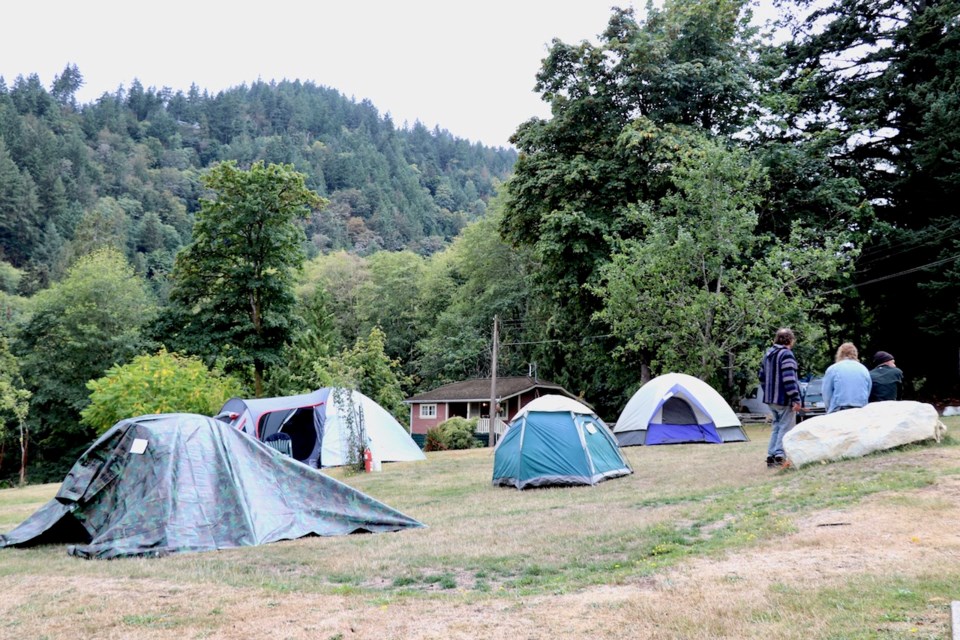Davies Orchard has some new tenants this week.
A few Bowen Islanders have set up four tents on the Metro Vancouver-owned property to bring awareness to Bowen’s housing crisis and to push for a solution.
Michael Chapman is the current spokesperson of the protest,
“We’ve set up a tent city here in Crippen Park…to help people visualize the housing emergency that we’ve been going through for last approximately seven years on this island,” he said. Chapman points to seven years ago as a turning point for housing stock on-island.
“A community has to have some balance in it and the balance is gone right now,” he said. “One house comes up with 25 people showing up.”
He said that they’re going to be there until they get some housing.
While camping isn’t technically allowed on Bowen, in the absence of available shelter in a given community (and since Bowen has no active shelter), people may erect their own on Metro Parks property. (A 2015 B.C. Supreme Court ruling established a precedent for allowing homeless people to camp in public spaces in communities where there is insufficient shelter as part of their charter rights to “life, liberty and security of the person.”)
“What inspired me is having seen the tent cities popping up all over British Columbia. Every time there’s been a tent city, [it seems that] government has been proactive and provided housing, so it seems to be this is the commodity they understand,” said Chapman.
“More than anything, this has been a slow moving issue that’s becoming a crisis,” said Peter Frinton, a long-time islander and former municipal councillor. He noted that the tents are set up on the sites of now-demolished cottages and trees cover sewer hookups, the only remnants of the buildings. “Fifty years ago, around the time I moved here, there were all kinds of cottages that people lived in and rented for very little money. There was a surplus of rental accommodations.”
But with the rise in housing prices, the discovery of the island as a good place to raise a family and many argue the rise of AirBnB and its strain on the long-term rental stock, the housing landscape on-island has changed dramatically.
“And this affects not just people who have very little money, it affects all kinds of people that want to sell the family home and move into a different form of housing,” said Frinton. “[There] simply isn’t a range of housing available on this island. So people move off. So long-term residents are lost.”
Jennifer Davidson has lived on Bowen since 2011. For many years, Davidson lived in her boat in the Bowen Island Marina and Mannion Bay but then, with Bylaw 418 (use of public beaches and water areas), she was no longer allowed to live aboard her boat for more than 48 hours in a 30-day period.
“I’ve had to stay in tents in and around Bowen over not this last year but the year before, once they put their bylaws into effect and started enforcing it,” said Davidson. Though she currently has housing, she and her partner will need to move next spring.
“Hopefully this will make a difference,” she said. “I know Robyn Fenton is doing the BIRCH stuff, which is really great, which will be affordable and diverse housing. But that’s looking like it’ll be [a few] years down the road and something needs to be done now.”
“We’re doing everything we can,” said Mayor Gary Ander. “There is an affordable housing crisis.”
“They certainly have the right to do that [tent village],” he said. “Unfortunately it won’t expedite our process at this time...we’re doing all we can.”
Ander said that while the municipality doesn’t have the money to do its own housing projects, it has land and has been trying to build housing development partnerships.
A spokesperson for Metro Vancouver said that staff are monitoring the Crippen Park situation with no enforcement plan.
Last month Bowen Island Municipality announced that it received a $15,000 grant to conduct a housing needs report to assess key housing needs in order to inform local housing priorities and development.
In the meantime, with fall on its way, Chapman is going to continue camping in the orchard.
We’re looking for solutions now,” he said. “There’s no need to waste time identifying the problem, we know there’s a problem.
“It’s not huge in the sense of big numbers but it’s huge in the sense of the effect it has on people’s lives.”



